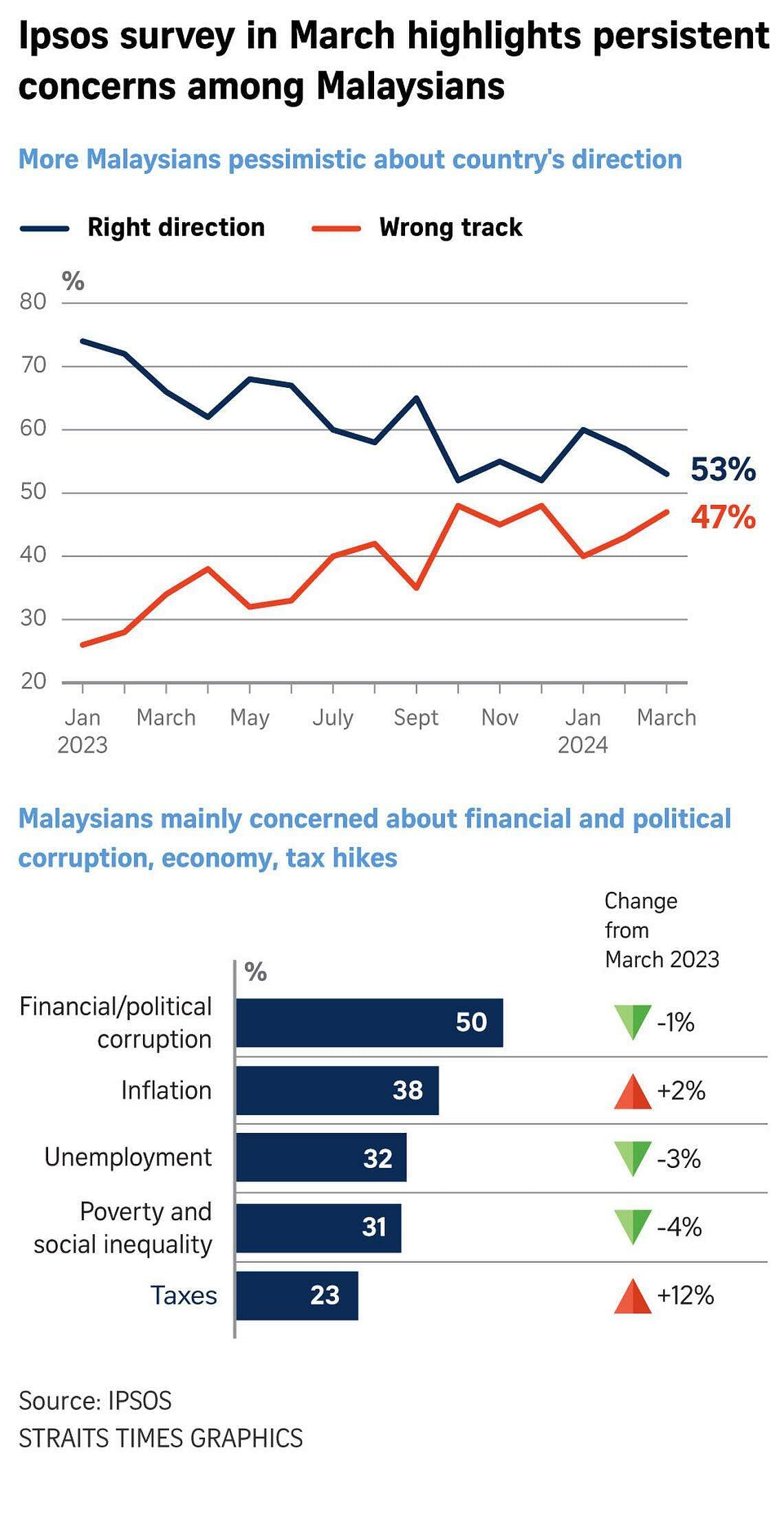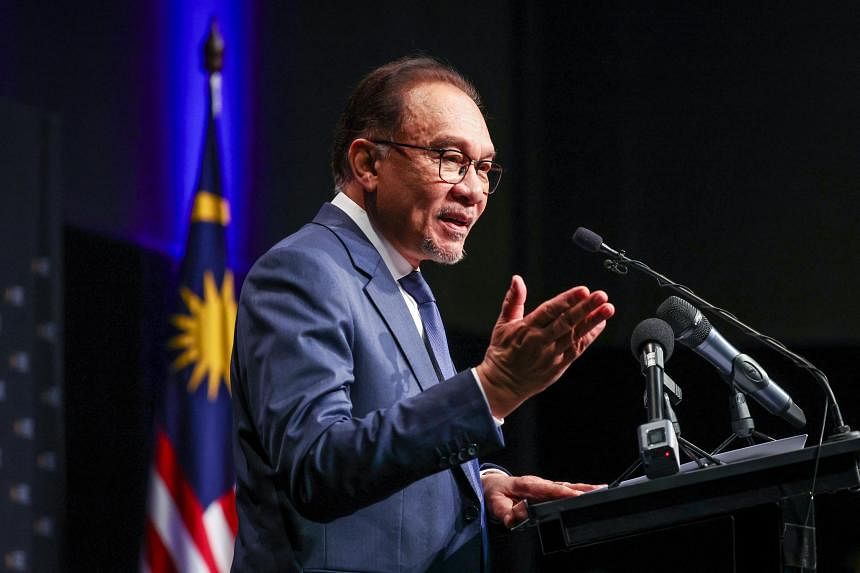KUALA LUMPUR – The latest survey by global market research firm Ipsos on “What Worries Malaysians” points to persistent concerns over not just bread-and-butter issues but also graft, despite Prime Minister Anwar Ibrahim’s ongoing message against corruption, say experts.
The poll result raises questions about how effective his government is after 15 months in power. A previous study by pollster Merdeka Centre in November 2023 also found that his approval rating had dropped to 50 per cent from 68 per cent in December 2022.
The Ipsos study, which polled 500 Malaysians via an online portal system, found that 47 per cent of Malaysians believe the country is headed in the wrong direction in March 2024 compared with 26 per cent in January 2023, right after Datuk Seri Anwar took office.
Of that 47 per cent, their primary concerns are financial and political corruption, inflation and unemployment, followed by poverty and social inequality, and taxes.
Politically, analysts say these concerns could have a direct impact on the upcoming Kuala Kubu Bharu by-election in Selangor on May 11.
“The results should be worrying to the Anwar government, as the issues which people are most concerned about pertain to socioeconomic ones, which they expect the government to resolve, as opposed to racial and religious issues that are beyond any government’s capability to resolve.
“So, if Anwar cannot rein in inflation, control corruption and hold off on the new taxes fast enough, he risks losing more votes in the by-election and the next (general) election, and thereby possibly losing his government,” Dr Oh Ei Sun, a senior fellow at The Singapore Institute of International Affairs, told The Straits Times.
Dr Oh said that dissatisfied supporters of the ruling coalition Pakatan Harapan (PH) are likely to sit out the by-election, as the alternative is voting for the opposition Perikatan Nasional (PN) which is dominated by Islamist party Parti Islam SeMalaysia (PAS), based on his observations of Malaysia’s by-election voting patterns over the years.
Mr Anwar’s supporters are usually ethnic Chinese, Indians and progressive urban Malays. In Kuala Kubu Bharu, the racial breakdown is 46.4 per cent Malay, 30.7 per cent Chinese, 18 per cent Indian and 5 per cent others, out of 40,015 eligible voters recorded in 2023.
PAS and their allies in PN have been gaining ground among the Malay voters. If more Malays than non-Malays head to the ballot box, there is a risk of the government losing the seat.
The Selangor state assembly seat was vacated after the death of its three-term PH assemblyman Lee Kee Hiong on March 21.
A study by Asean+3 Macroeconomic Research Office on Feb 20 found that Malaysia’s inflation is cooling.
But economist Paul Anthony Mariadas, who lectures at Taylor’s University, said on March 7 that the ringgit’s steady depreciation versus the US dollar since the start of the year has left many Malaysians feeling the pinch as imported consumer products cost more as a result.
It does not help that there is a perception among some that Mr Anwar is favouring his allies when it comes to corruption, despite his electoral promise to combat graft. His deputy Ahmad Zahid Hamidi received a discharge not amounting to an acquittal over his corruption charges in September 2023.
Similarly, the reduction in sentence from 12 to six years for convicted former prime minister Najib Razak by the Pardons Board in February also did not go down well, especially with Mr Anwar’s supporters.
The graft probes by the Malaysian Anti-Corruption Commission into former finance minister Daim Zainuddin and his wife, as well as former prime minister Mahathir Mohamad’s sons – Tan Sri Mokhzani Mahathir and Mr Mirzan Mahathir – have also caused a stir.
Dr Bridget Welsh, an honorary research associate at the University of Nottingham Asia Research Institute-Malaysia, said the increased discontent is no surprise as Mr Anwar’s traditional base of support has become less optimistic and holds a negative perception of the country’s economy.
“Sadly, one of the problems is that the government is not listening – such as moving ahead in programmes such as Padu that received a lot of resistance, seeing that it was poorly implemented,” said Dr Welsh, referring to Malaysia’s Central Database Hub (Padu).
The database is a key component of a wider plan by Mr Anwar to reduce government subsidies – estimated at RM64 billion (S$18.2 billion) a year – by starting targeted subsidies and direct cash transfers based on metrics such as household income, family size and monthly expenditure.
But there are concerns that the system, which stores personal details including identification card numbers and home addresses, can be hacked. This resulted in the registration of only 10.6 million out of Malaysia’s 30.4 million population.

Universiti Kebangsaan Malaysia’s Institute of Ethnic Studies deputy director Kartini Aboo Talib pointed out that Mr Anwar has a lot of work to do to convince the public that he can bring Malaysia to greatness.
“The increase of the Sales and Services rate from 6 per cent to 8 per cent across sectors such as finance and leisure, unemployment, rising cost of living, increased mortgages and continuous inflation are the challenges that Anwar has to overcome, or at least reduce the inevitable tensions on consumer goods.
“With these issues, the confidence that Malaysians used to have has been withering gradually,” said Professor Kartini.
In order to reverse the current trend, Dr Welsh said that the government needs to reverse the tax increase, offer a small economic stimulus and postpone programmes such as Padu until it can be better implemented.


